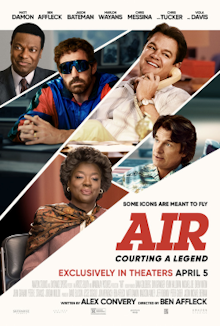Films about corporations are rare and one that portrays a large corporation in a good light are even rarer. Moreso than it is about Michael Jordan, the story here is really about Nike’s rise from being a middling sports shoes company to the global behemoth it is today with the help of the Air Jordan line. It’s so flattering to Nike that it’s hard to believe this isn’t some sort of Nike commercial. Ben Affleck does a decent if unspectacular job at directing. It’s rather heavy-handed in mining 1980s nostalgia and too blatant about playing up the mystique of Michael Jordan, but it works well enough and I’m pleased as punch that it even exists.
In 1984, Sonny Vaccaro is a talent scout for Nike, charged with identifying and signing new players to represent their line of basketball shoes. At that point, Nike’s market share is a distant third behind Converse and Adidas and is considering shutting this division to focus on running shoes. The Nike team is aware of rookie Michael Jordan’s incredible potential but assumes that he is off limits as he dislikes Nike and they don’t have the budget to afford him anyway. Sonny tries to get Nike’s CEO and co-founder Phil Knight to increase his budget but fails as he needs to be accountable to the board. After rewatching video highlights of Jordan’s performance, Sonny believes that he is a once in a generation talent. He doubles down and wants Nike to devote their entire budget on making a new line of shoes named after Jordan instead of spreading it out over three or four other players. After Jordan’s agent David Falk dismisses him, he thinks about going around Falk by approaching Jordan’s parents directly.
In case anyone was wondering, there’s no basketball playing here and Michael Jordan never really appears. He’s just this mysterious figure whose face is never seen, and even Sonny getting to speak with him is portrayed as a big deal. The film is really about Nike, or at least one specific division of Nike, centered around Sonny, Phil, their Marketing Vice-President Rob Strasser and their lead designer Peter Moore. It’s a business movie in the truest sense, as Sonny, convinced that he is right, works to persuade the rest of the Nike team to carry out his plan despite the risks to the company and to his own career. It also depicts Jordan’s mother Deloris as the person who makes the big decisions on his behalf and best represents his interests. There are hard numbers about the value of Jordan’s contract and the size of the basketball shoes market, and plenty of detail about the internal workings of the company to satisfy the curious. I’m not sure that Nike was ever really such a chill place to work even in the 1980s or that Phil Knight was so permissive with the people who work for him, but it is a rather positive portrayal of a corporate environment. That’s novel enough that I’m inclined to look favorably on it.
In the end, this still just is the story of a shoe line and there’s only so much Affleck can do. It’s amusing to recognize all of the half-forgotten objects of the era, in-car phones, wired remote control units, handheld gaming devices and brief snippets of hit songs. Yet the film does it so much that it gets irritating and it’s not a replacement for actual storytelling. Finally there’s the question of how true this account is. The film emphasizes the role of Sonny Vaccaro but others tell it differently and indeed his meeting at the Jordans’ home seem to be an invention. In the end, the deal was likely much more about the money than any other factor as Nike simply offered Jordan more than what is shown here. In the same vein, Falk was more important than someone the Nike team had to work around. He had signed big deals for other basketball players before and was instrumental in getting more money for Jordan.
As it is, this makes for a fascinating inside look at the inner workings of a corporation but it doesn’t have enough of an edge to be truly good. I get why it can’t say anything bad about Jordan or his family, but surely humbling Nike a little would be acceptable. It neglects to mention for example that both Strasser and Moore left for Adidas a few years after the deal and that’s just how the business world works.

One thought on “Air (2023)”